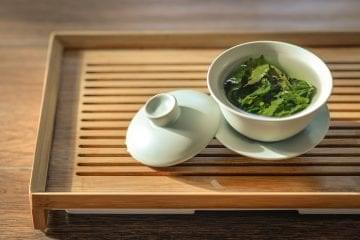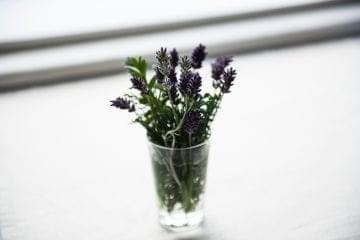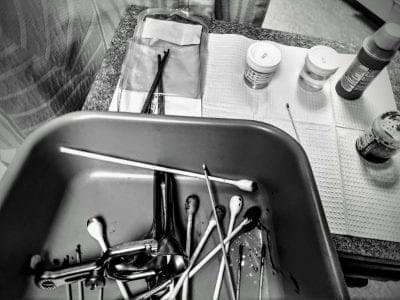There are many herbs that reduce anxiety but a significant amount are contraindicated before surgery, blood tests or other major medical procedures. The horrible irony is that these incidents are exactly the kind of situations in which you need anxiety-reducing herbs the most. Fortunately, there are a number of herbs that are safe and effective for these situations. As always, Mother Nature has healing for us all.
Using herbs daily is very different than using herbs for an urgent care situation. Some herbs do their best work after they have had time to reduce inflammation and “retrain” the HPA axis. Some herbs have a calming effect that can be felt quickly. Keep this in mind when using herbs that have cautions for long term use but you are considering using for an isolated situation. Ask your qualified healthcare provider before using any of these herbs to be sure that they are safe for you before your upcoming procedure.
Our bodies produce GABA and serotonin to help us relax and be more productive problem solvers. The fight or flight response is great for dodging an oncoming bus but staying calm and alert is how you stay out of the bus lane in traffic. In high stress situations like medical procedures, that fight or flight response is a barrier to getting the healthcare you need. These five herbs are trusted sources of nerve-calming goodness.
5 Herbs that Reduce Anxiety

Green Tea
Green tea is a significant source of L-Theanine. This amino acid helps calm you down naturally. If the caffeine in green tea is a problem for you, consider trying decaffeinated green tea. Adding a slice of orange or lemon gives that cup an extra boost to your mood and adds a sprinkling of vitamin C. The ritual of making and sipping a cup of hot green tea is a soothing practice as well. Try taking a second to breath in the aroma of the tea before taking a sip. Deep breathing is a vital part of reducing anxiety.
Lemon Balm
Lemon balm has a long history of anxiety reduction. Even the fresh lemony taste is enough to brighten any one’s day. The effect that lemon balm has on the system is more than just flavor. Lemon balm calms upset stomachs and increases serotonin which gives you that happy feeling. It reduces agitation and other symptoms of anxiety attacks. Lemon balm is easily made into tinctures, teas and delicious syrups. It is good herb to combine with motherwort for anxiety attacks that are accompanied by rapid heartbeat. Long term use is not recommended for patients with hypothyroidism.
Catnip
Most people think of catnip as an herb exclusively for wiring cats up for playtime. This member of the mint family has the opposite effect on humans. The taste of catnip can be a little off-putting but it combines well with other relaxing herbs like chamomile or spearmint. This herb is very soothing to the nerves in the digestive system as well as other parts of the body. It is often available in tincture and in bulk herb form for loose leaf tea. As more people discover the calming influences of catnip, you can look forward to finding it offered in other forms on market shelves.

Lavender
Lavender is available in so many forms for so many reasons. Usually, people think of lavender essential oil yet for the chemically sensitive, a tea, syrup or tincture may be more appropriate. Like other herbs, lavender has a combination of chemical that work together to relax frayed nerves. If you are using lavender essential oil, consider the effect on other patients waiting in the office for help. Even one drop under your nose, may be all you need to sooth your nerves and is, truly the most cost-effective way to savor the nano particles in essential oils. Lavender is a calming nervine that doubles as an antimicrobial herb. In many ways, it is perfect herb for medical settings.
Passionflower
Passionflower is underutilized for anxiety in North America. It is a moderately sedating herb that is relied on for helping people with insomnia. Studies verify that passionflower is an effective anxiety reducer (anxiolytic effects). A dropper full of tincture (between .5ml-.10ml) in a small amount of water is enough to wash it down comfortably. Do not take this herb before undergoing general anesthesia as it will increase the effects of the drugs. Passionflower is not contraindicated in topical anesthetic and is appropriate to take before a dental procedure such as before getting a cavity filled.
Other Dosage Options
If your medical procedure requires that you do not drink water beforehand but you are allowed to wet your mouth, put your tincture in a tablespoon of water, swish and swallow. There are a heavy concentration of capillaries and nerve endings in the mouth. This helps get the compounds in the herbal rinse into your system quickly.
Consider an herbal foot bath before going to the doctor. Adding some Epsom Salts in the bath with your herb of choice is good for keeping your mind and body relaxed. Check this link for safe herbal foot bath directions.
A small spritzer bottle with your herb of choice is handy in a pinch. Fill a sanitized, pocket-sized, spray bottle with concentrated tea or water with a dropper of tincture. When you feel yourself getting rattled in the waiting room, just shake the bottle then squirt a little into your mouth or onto your hands and wrist. Breathe.
Links for General Anxiety Care
Podcast 164: Herbs for Anxiety, Depression and the Holidays
Podcast 74: How to Treat Anxiety with Herbalism and Essential Oils
Anxiety – Natural Treatment Options






